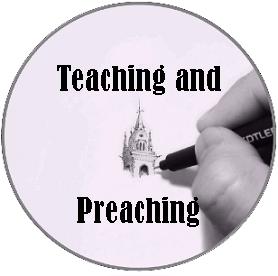Marks of a Good Preacher
Marks of a Good Preacher
The following tentative observations are very personal and carry no authoritative weight. They are merely my ruminations and reflections as a Christian who has been on the receiving end of many a sermon over the last several years. (I’ve come under the preaching of more than two dozen men in the eight short years since I first repented of my sin and publicly proclaimed my belief in Christ as Lord and Saviour.)
These thoughts were precipitated by the need to fill a pastoral vacancy in our own congregation. They are offered to those who may also be struggling with the void created when a congregation looses its under-shepherd and it is in need of guidance and support through the usually protracted period of the vacancy.

But let me begin with a word of clarification. There are two functions most often associated with the Pastor: one function is teaching, the other is preaching. The Bible lists these two functions separately, Eph. 4:11 for instance, but if we take Paul as representative then we are led to the reasonable conclusion that often, if not always, teaching and preaching were carried out by the same person depending on the circumstances (1 Tim. 2:7; 2 Tim. 1:11). Notwithstanding, the functions are separate whether or not one man performs both and even though it may be hard for us to know when the preaching ends and the teaching begins, as in many sermons.
The word for the act of teaching most commonly used in the NT is didasko while the word used for preaching is kerusso. Didasko means to hold a discourse with another person with the intention that the other person will learn something from the encounter; it is to impart instruction of some kind through dialogue. It is essentially didactic. Kerusso on the other hand refers to proclamation, or announcement. A preacher is first and foremost a herald. It is he who heralds – that is proclaims – the character of God and His plan of salvation as found in both the Old and the New Testaments.
A preacher’s first and most important duty is to herald this message for God’s people. The second and separate duty is to teach others to grow in the grace bestowed on them by God, won for them by Christ and applied to them by the Holy Spirit.
So with these preliminary thoughts in mind, let me begin by stating the obvious: a preacher will be, beyond doubt, a born-again Christian; the fruit of the Spirit will be manifesting in his life to a discernable degree and he will have an unshakable conviction of his calling. As well, a preacher will conform to the essential nature of the criteria for elders given by Paul in his letters to Timothy and Titus.
Finally, he will be a man who strives to live a pious and holy life. This being the case, what might be some of the attributes or marks of a good preacher?
Authority⤒🔗
Since a preacher is really an ambassador for Christ (2 Cor. 5:20) the first mark must be authority. Just as a worldly ambassador or herald has the authority to speak for the leader of his country, so a preacher speaks for the Leader of his country, the Kingdom of Heaven, who is the triune God. And just as the worldly ambassador is given his authority by his country’s ruling powers, so too a preacher’s authority comes not from himself but rather from God through and in the person of the Holy Spirit. Just as Christ did nothing on His own, but did the will of His Father in all things (John 5:19, 30; 6:38) so too a preacher must do the work of Christ, his sovereign Lord. This means being a servant of the whole counsel of God.
A preacher can never pick and choose what he will preach, neglecting those truths he may find personally disagreeable. He must be prepared in and out of season to speak only as his rightful King directs him through the leading of the Holy Spirit and the direction of God (Isa. 6:5-8) through His Word. So, a preacher will speak with authority.
He will speak not as the scribes and Pharisees (Matt. 7:29) but as one who speaks on behalf of and for his Master in Heaven. Consequently, his Master will, through the working of the Holy Spirit and the illumination of Scripture, enable him to speak the very words of God.
But what are the means employed by a preacher to know and understand what he is to proclaim (kerugma)? I believe that to a great degree, a preacher must also be a prayer. He must saturate himself with prayer; the prayer of one who is dependent on the great triune God and who consequently will be obedient to His will (Phil 2:5-8). Without prayer, there can be no preaching because there is no relationship with God. Prayer is the conduit for maintaining a one-to-one relationship with God, thus being open to the leading of the Spirit through the agency of the Word.
Confidence←⤒🔗
A shy man is likely to have a harder time reaching out and impressing others than one who is relaxed and at ease in the company of others. A preacher must be confident in himself while not being over-blown with his own talents. While he must be a confident man, he must also realize that the source for this confidence must be found outside himself. So he will trust always in the strength and wisdom of God who has given him the very gifts and talents he is called upon to use in his role as herald.

His confidence, unlike his authority, is the working out of his trust in personal experience and is usually a product of trials and difficulties over the course of many years (2 Peter 1:5-8; James 1:2-3). Thus, all other things being equal, an older man is often the better preacher, and a good preacher in his youth will usually improve with age as his experience informs and deepens his understanding and knowledge of the ways of God in his life and the lives of others.
Confidence also implies personal strength and integrity. The confident preacher will not bend in the first little breeze that comes along, nor will he be tossed to and fro like a child who is powerless and at the mercy of others (Eph. 4:14; James 1:8).
Humility←⤒🔗
He must be contrite and humble in his own life (Ps 51:17; Pr. 16:19). This does not imply conflict with the attribute of confidence; the two are not contradictory as much as complementary. The confidence of a preacher will force people to sit up and pay attention but his humility will prevent him from exalting himself in his confidence and his talents. His humility will act as a strong counter-measure to the arrogance and pride that confident (and accomplished) men must always be on guard against.
His humility will allow him to remember that he is merely the messenger, the herald of the Good News and as such he must never let his own agenda come to the fore instead of the message God intended him to preach. His humility will enable him to speak the truth in love, regardless of the offence it may cause in the pews, but at the same time he will never say things merely for their shock value alone. Indeed, when the preacher is in the pulpit, he must decrease while Christ must increase (John 3:30).
Knowledge←⤒🔗
I speak here not only of biblical knowledge, although that is essential. I’m referring to a more general kind of knowledge concerning the things of the world of science, literature, art and culture.
While the preacher must be pious and strive for biblical holiness, he should also be well-informed and not bury himself in theological treatises to the exclusion of being a human among other humans and who will see God’s handiwork as much in a play by Shakespeare, a sonnet by Donne, a fugue by Bach, or a painting by daVinci as he does in his Bible. But in his knowledge of the natural world, the preacher should also be cognizant of God’s sovereignty over all creation (Job 38:1-39:30).
Certainly, the preacher must be swathed in the Word of God. It must inform his every waking thought. He must have large portions of it memorized and must be able to use it for doctrine, reproof, correction and instruction in righteousness (2 Tim. 3:16), remembering that it is the sword of the Spirit (Eph. 6:17) used for cutting through all worldly deceptions (Heb. 4:12).
But to know his Bible well, he must be familiar and comfortable with the Hebrew and Greek. To that end he must study diligently in these two languages. He must also have a sound understanding of the important translations in current use and the underlying original-language texts from which the translations are derived. He must be able to defend his own choice of translation, whatever it may be.
Compassion←⤒🔗
A preacher without compassion for the lost and suffering souls in this world is in my opinion no preacher of God. How can a man proclaim the Good News of redemption and salvation which is freely offered to all (Isaiah 55:1-2, 6-7; 1 Tim. 2:4) who is not motivated by love and sorrow for suffering, and who has no passion to relieve that suffering to the degree enabled him by the Holy Spirit? The gospel of Christ, and his sacrifice for all who will come to believe in Him as their Lord and Saviour, is undoubtedly for God’s elect (I am no Arminian), but election, in and of itself, saves no one. It is only through the once-for-all payment for sin that the elect are able to inherit the salvation won for them by Christ. But how are they to call upon Christ for salvation if they do not believe? And how are they to believe in Him of whom they have not heard? And how are they to hear without a preacher (Romans 10:14)? No, for me the error of denying the free offer of the Gospel is not a mark of a preacher but rather a mark of one still living in bondage.
Affection←⤒🔗
A man may be knowledgeable and confident in his ability to rightly divide the Word of God and may have a strong intimation of the authority he wields on behalf of his Master, but if he lacks warmth and affection he won’t necessarily be embraced or readily accepted by his flock. He may, as a result, be hampered in his ability to teach them or counsel them in times of trouble. God is love; it therefore stands to reason that someone who claims to know God and to speak for him must also be able to express love and genuine affection in his thoughts, words and actions (1 John 3:14).

This is not to say the preacher must be an extrovert. That is something entirely different, although extroverts have less difficulty getting to know others. But the people of his flock must trust and feel that they can genuinely grow to like this person. Affection goes along way to building trust and trust is essential for the effective work of a preacher.
Passion (Zeal)←⤒🔗
The preacher must love God’s Word even as the Psalmist (Ps. 119:14, 20, 35). If a preacher is indifferent to God’s Word or the great responsibility to which he has been called, how is he to be of any benefit to others who may need the encouragement, edification, admonishment or even discipline that only someone who is passionate about God is able to convey? Indeed, I would go so far as to say that if one is not passionate about his calling, it is likely a sign that he is not really called to begin with.
Many a preacher has taken up this way of life as an act of gratitude for his own salvation. It is something he “feels” called to as a way of expressing his thankfulness and joy over his God-enabled conversion. Another may decide to become a preacher because he loves untangling theological knots or solving linguistic riddles. Such men are likely worthy Christians but probably should not consider the pastoral call.
A preacher must understand that he will be held to a higher standard than others (Luke 12:47-48; James 3:1) and so must be absolutely sure of what it is he is doing and why he is doing it. He will then be able to make the sacrifices the calling sometimes demands.
Courage←⤒🔗
A preacher must be able and willing to “suffer the slings and arrows of outrageous fortune” if he is to be a herald of God and His Kingdom. He must be able to stand up for what he believes, fully clothed in the armour of God, wielding the sword of the Spirit.
In today’s pluralistic, relativistic society where the new paganism of Secular Humanism is the predominant world-view, fundamental Christian doctrines are being constantly attacked – even within the Church herself – and so it can be hard and discouraging to stand for God’s truth and His absolute standards. A preacher must be courageous enough to suffer abuse whether he is proven right or not. The man should not be a shrinking violet in the face of opposition but must be prepared for onslaught at any moment, from any direction (2 Tim. 1:7).
He must have the perseverance to maintain God’s standard of holiness in spite of what others – even his own loved ones – think or believe. He must – of all people – be an over-comer (Rev. 2:17) firm in the conviction that he is more than a conqueror through Christ who loves him (Rom. 8:1).
Patience←⤒🔗
A preacher will have to have patience, not only for the members of his flock, but also for himself. There will be times when he will not see any spiritual growth in the congregation, in spite of his best efforts (or, may it never be so, just because of them). He may notice that people seem lukewarm in praise or unmoved during his preaching. He may see uncomprehending stares at each and every service in spite of his attempts to clearly articulate his hermeneutic.
He may be frustrated at the lack of growth in numbers in spite of his evangelistic outreach, and will be in danger of loosing his patience. But as bad as these may seem, worse yet is a preacher who looses patience because he has come to rely on himself and his own personal strengths and talents. A good preacher will always wait on the Lord in trust and confidence, knowing that it is God’s sovereign will to work all things for good according to His pleasure (2 Cor. 3:5; Eph 1:9; Phil 2:13) even when He may be chastising the congregation for a season, whatever the cause (Rev. 3:1-2).
Physically Strong and Constitutionally Healthy←⤒🔗
While it would be ideal for a preacher to be strong and healthy, such is very often not the case. Nevertheless, preaching is tough and demanding work – at least I imagine it to be – for the sincere and earnest man. Being in good health and condition will make burning the midnight oil when studying and writing all the easier.

As well, standing for lengthy periods delivering the sermons (not counting the fellowship after) is demanding on back and joints and can be very tiring. This is not counting the visits to families, along with Bible study or prayer meetings on one or more evenings during the week.
While a man who is zealous for his work and the calling he strives to fulfil can to a degree overcome personal weakness or compromised health, it is nevertheless not an ideal. A good preacher must therefore be moderate and conscientious in his lifestyle and activities.
In summary then, I would say that these are at least some of the qualities or marks I would definitely look for in a preacher of God’s Word. Of course, each potential preacher will have some of these marks to a degree but no one will exhibit these marks in every situation or to the same degree in every case.
So is the list definitive? No. Neither is it complete or comprehensive. Much more could be said about such qualities as honesty, self-denial, optimism, trust and others (and has been said by many others with greater wisdom as well as experience) and perhaps every person would come up with a different list of attributes or marks of a good preacher. This one just happens to be mine. I pray it will be of some value.

Add new comment